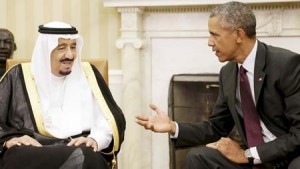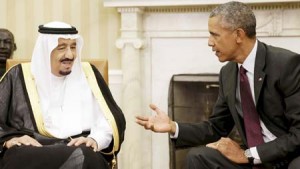Financial Times
 Saudi Arabia has drawn up a new strategy to convince US companies to invest in the kingdom, as it struggles to deal with the impact of sharply lower oil prices.
Saudi Arabia has drawn up a new strategy to convince US companies to invest in the kingdom, as it struggles to deal with the impact of sharply lower oil prices.
Officials have been contacting a host of US corporations as Riyadh looks to increase foreign investment in its stuttering economy and boost employment, according to people familiar with the matter.
“The point is to attract inflows of cash and create jobs, which is why there is a focus on retail and healthcare, which are both labour intensive sectors,” said one Saudi banker briefed on the plans.
Mohammed bin Salman Al Saud, Saudi’s deputy crown prince, met a number of American chief executives when he and his father, King Salman, visited the US in September. Saudi officials have also been in contact with leading private equity firms to ask whether Riyadh can do business with their portfolio companies, one financier said.
The investment push is part of Saudi Arabia’s drive to lessen reliance on oil prices, which have fallen from about $115 a barrel in the summer of 2014 to $36.
One official leading the drive, Khalid Al Falih, health minister and chairman of Saudi Aramco, the state-owned oil company, last month said the economy had grown at an “incredible pace” of 5 per cent per annum over the past half-century, adding that he had every “reason to believe the next 50 years is going to exceed that rate”.
He insisted growth in technology, healthcare, tourism and transport would turn “challenges into opportunity” as the kingdom shifted from commodities exports to manufacturing.
At a high profile conference in Riyadh last month, ministers expanded on their plans for more privatisations and foreign investment opportunities in an economy that is heavily state reliant. The government is also set to extend public-private partnerships to build infrastructure while keeping spending off its own balance sheet.
The education ministry wants to increase private school capacity to 25 per cent of school places from the current 14 per cent, while the health ministry is halting new facilities to allow the private sector to deliver and operate hospitals and clinics
The potential that Saudi Aramco could float some of its holding company — or, more likely, bundling downstream assets together for a listing — has also sparked intense interest. But some foreign investors and local bankers are also concerned that the pace of change will move too fast for the kingdom’s bureaucracy.
The government, led on economic affairs by Mohammed bin Salman, has pushed through a significant reform of energy subsidies that raised the price of petrol, electricity and industrial feedstocks.
But one veteran banker said: “My concern is that there is so much on the agenda, and there are so many discussions, that not much output is going to result from it all.”
Mohammed bin Salman’s powerful economic committee is working alongside the Saudi Arabian General Investment Authority (Sagia), the promotion and licensing body for foreign investment, to boost domestic competitiveness and channel investment.
“We are figuring out ways to attract global companies to invest over the long term,” Prince Saud bin Khalid Al Saud, Sagia’s deputy governor, said last month. “The type of investment we are targeting are those that add value to country.”
But Sagia has a reputation for overly officious regulation, say investors and western officials, particularly for small businesses. Bankers and investors looking at opportunities in other areas, such as King Abdullah Economic City, have also had to content with excessive bureaucracy.
“Sagia has become a bureaucratic organisation, rather than being there to help the cause of foreign investors,” said one investor. “We pay them and count on their assistance, but their services are not commensurate with the charges.”
Prince Saud countered that Sagia has had to crackdown on some investors misusing their licenses to carry out retail operations.



